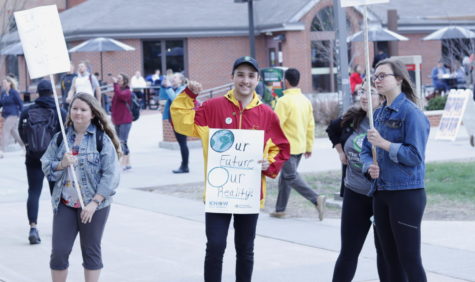Smoked out…?
February 29, 2008
The Iowa Senate passed a statewide ban on smoking in public places Wednesday, just one week after a similar version was passed in the Iowa House of Representatives.
The bill, which bans smoking in restaurants, bars, casinos, places of employment and property owned by the state government, has been the subject of much debate in the last week at the capitol and on the ISU campus.
The ban comes in reaction to growing public awareness to the dangers of secondhand smoke.
“Secondhand smoke is a public threat,” said George Belitsos, chairman of the Story County Tobacco Task Force. Belitsos feels that it is a person’s right to have a safe and clean environment and that “it’s no one’s right to pollute the air.”
Eric Cooper, associate professor of psychology and adviser to the ISU Libertarians, disagrees. Cooper said such a large ban is “not constitutional” and bar owners should have the right to choose whether they want to allow smoking.
“The market provides both types of places, so the market should regulate it, not the state,” Cooper said.
State Sen. and associate professor of economics Herman Quirmbach, D-Ames, said Ames is ready to make the transition that would be mandated if the bill passes. He said he isn’t worried about businesses being reluctant to respond to the new law.
“We may be ready for a statewide ban,” he said. “Ninety-five percent of Ames restaurants are [already] voluntarily smoke-free.”
However, some bars, such as Café Beaudelaire, 2504 Lincoln Way, which allows smoking after 8 p.m., worry that the ban could hurt their business.
“We serve a diverse clientele, some of which are foreign exchange students who smoke because of their culture,” said Megan Wheeler, senior in English and bartender at Café Beaudelaire. “I would personally like it,” she said, “but [the choice] should come down to the businesses.”
Though some believe the ban could hurt businesses, others, including Sen. Quirmbach, do not think the ban will affect businesses in the long run.
“I understand their fears,” he said. “But there is no economic evidence to support that. In New York City, revenues actually went up after the ban.”
As unlikely as it might seem, some smokers support the ban, as well.
“I honestly agree with the ban,” said Sarah Blume, freshman in pre-journalism and mass communication. “It’s my choice [to smoke], and I won’t let it affect other people.”
If the proposed ban passes, Blume’s smoke may not affect other people, but she admits that the new restrictions and the possibility of a smoke-free campus in the future would certainly make their presence felt.
“I know it sounds pathetic, but if campus was smoke-free, I would probably choose to live off-campus or be forced to quit smoking,” she said.
The incentive for others to quit is something that makes people like Belitsos feel like all the hard work put into legislation is paying off.
“Ames is really at the center of the issue,” said Belitsos, who, along with Quirmbach, played a large role in getting the original Ames smoking ban passed. “We were the first city in Iowa to have an ordinance, and the Ames ordinance really sparked the debate.”
The smoking ban will travel back to the House to vote on the Senate version, which includes casinos in the ban.
















